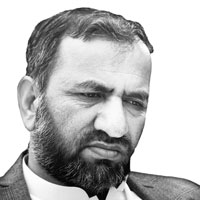Around midnight late last week, half-a-dozen gunmen quietly scaled the 12-foot-high mud-brick wall surrounding the modest house and stealthily entered Janbaz Khan’s bedroom in eastern Afghanistan’s Paktika province. They put a gun to his head, blindfolded him, and bound both his hands behind his back. They warned him not to move. “We are staying on top of you so don’t make a sound or we’ll shoot,” Janbaz later recalled them saying. He obeyed. In the morning his brother, who had been sleeping in an adjoining room, found him and removed the blindfold and cuffs. Immediately both men realized what had happened. They rushed to the bedroom of Janbaz’s wife, Sushmita Banerjee, the Indian author and health care worker, and discovered what they had feared. She had vanished.

At three a.m. that night, an elderly woman in a neighboring village tells The Daily Beast that she was awakened by the sustained crackle of gunfire. She thought a family was celebrating the birth of a baby boy. But what she actually heard were the sounds of Banerjee’s brutal execution. Nayab Khan, a 50-year-old villager, found her body, dressed in her night gown, dumped at the gate of a government school about one kilometer from her home. Although Banerjee’s face had been obliterated by several of the 15-20 bullets that police say her executioners had fired into her, Nayab immediately realized who the dead woman was. “She was not wearing a normal Afghan village woman’s dress and chador,” he told The Daily Beast. “So I knew it was the Indian wife of Janbaz.”
The Taliban were quick to deny any responsibility of Banerjee’s death, particularly since she had converted to Islam when she married Janbaz in the 1990s. “This is the enemy’s propaganda that is blaming us for killing a woman,” said the spokesman Zabiullah Mujahid. But an increasingly powerful, renegade Taliban militia—The Suicide Group of the Islamic Movement of Afghanistan—was proud to announce that it was the killer. The group, led by Mullah Najibullah, broke away from the mainstream Taliban earlier this year as it rejects any peace negotiations with either the U.S. or Kabul, viewing those contacts as treason against the jihad-until-victory call of Taliban’s founder, Mullah Mohammad Omar. “We killed Sushmita Banerjee because she is an Indian spy,” the group’s spokesman, Qari Hamza, tells The Daily Beast exclusively. He admits that his men kidnapped, harshly interrogated, and then killed her. “We took her from her house, investigated her for three hours and then left her dead,” he says. “During our investigation Sushmita Banerjee also disclosed the names of other agents and we will go after them as well,” he adds. “We are against everyone who is engaged against the Afghans, the jihad and works with the American attackers.”
The Suicide Group’s accusations of espionage against her ring hollow. She hardly fits the profile of a spy. She lived in near poverty in the remote Afghan countryside near the Pakistani border and worked tirelessly at a private, rural health care clinic, concentrating on the well-being of local women. But the independent-minded Banerjee had long raised the Taliban’s ire by her uncompromising stand for women’s rights and betterment in a society that largely oppresses women and sees them as second-class citizens. Her 1995 book, A Kabuliwala’s Bengali Wife, which became a best seller in India and was made into a Bollywood movie, recounts in detail the austere and restrictive lives that rural Afghan women lead, her own run-ins with the radical ruling Taliban in her village, her arrest, and her escape from the Taliban. At one point the Taliban shut down her small pharmacy, saying that a woman is prohibited from running a business. According to one of her husband’s relatives, she told the Taliban in the 1990s: “I may be an Indian but I’m also a Muslim married to an Afghan. So I’m now a daughter-in-law of all Afghans. If you don’t want me then I will return to India.” She did so about one year before the Taliban’s overthrow in late 2001, but returned along with her husband to the family’s house in Afghanistan’s Paktika Province several months ago.
Villagers in the dirt-poor village of Sara Qala fondly remember her for her good works and her dedication to her husband and family. “There is no way she was a spy,” says villager Nayab Khan. “She was a wonderful lady with an eagerness to help the poorest women of Paktika.” “She was very happy and was in love with her husband Janbaz,” he adds. Villagers also respect how she cared for her husband’s first wife and their three daughters. “She was so nice taking care of her husband, his wife and their daughters,” says a village woman. The tall and handsome Janbaz, 40, an ethnic Tajik in a predominantly Pashtun region who favors big black turbans and sports a well-trimmed beard, hoped Banerjee would finally bear him a son, but they had no children.
Banerjee may have fallen victim to the bitter regional rivalry between Indian and Pakistan, which seems to be gathering steam as US and allied forces prepare to withdraw at the end of next year. Each country is vying to rope Afghanistan into its sphere of influence. Pakistan fears a strong Indian economic, diplomatic, and military advisory presence in Afghanistan. The Taliban, and particularly Najibullah’s breakaway faction, are staunchly anti-Indian, partly as a result of the strong influence that Pakistan’s Inter-Services Intelligence spy agency has over them. The ISI harbors, and is said to assist, the insurgents in their Pakistani border strongholds.
Najibullah’s Suicide Group has been increasingly active recently, and both Taliban and Afghan intelligence sources say the militia was behind the failed suicide attack on the Indian Consulate in the eastern town of Jalalabad this past April. Three of his suicide bombers were stopped short of their target and, under fire, blew up their explosive-laden car, killing 12, mostly children. Najibullah denies his men were involved, probably because Pakistan, which is said to underwrite the Suicide Group, wants deniability in these anti-Indian attacks. But Najibullah does not hide his enmity toward Indians. “There is no place for Indians in Afghanistan,” Najibullah told The Daily Beast. “They should be removed from the country.” “They are using Afghan soil against Pakistan and Afghanistan,” he adds.
Indeed, a top Taliban source named Zabihullah says of Najibullah’s Suicide Group: “Killing Indians are their top priority.”
“Mullah Najibullah was created by Pakistan,” says an Afghan government intelligence officer, “to terrify Indians into not helping and investing in Afghanistan.”
An Afghan police officer in Paktika, Abdul Shah Zarifi, told The Daily Beast that local cops had arrested two suspected Taliban who are suspected of being involved in Banerjee’s murder. He said the men had told interrogators that the assassination plan was hatched outside of Afghanistan, and that the gunmen killed her not only because she was passing on intelligence information about the Taliban to the enemy, but also because of her book and the fact that she was using the Internet at home.
Some of Banerjee’s neighbors add that her death may have been partly caused by the custom she had of not closely following local Afghan traditions, particularly the strict dress code for women, which dictates that women must wear an all-encompassing burqa when leaving the house. She tended to wear simple loose-fitting dresses, left her face and hair uncovered, and talked in public with both men and women—all transgressions in the conservative countryside. Her face uncovered, she liked to ride behind her nephew on his motorcycle. She was frequently teased by children, says Nayab Khan, for her habit of running around without a burqa. “She would scold the kids and tell them, ‘Think of your mothers and sisters when you laugh at me.’”
The local Taliban had threatened to kill her as a result of her breaking tradition. “Many times the Taliban had threatened her as she continued to go outside without an Islamic burqa,” says Nayab Khan. “We told her many times not to go outside wearing makeup and without a chador. She didn’t listen. She was the only woman in all of Paktika not wearing a burqa.” Banerjee brushed off the threats, he says. “She told me, ‘I am a 50-year-old lady and serve even Taliban wives and children, so why would they kill me?’”







